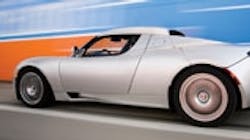Will electric cars ever get up to speed in the United States? Several moves over the past summer point toward progress in that direction. Two manufacturers have announced plans to build new production facilities in the United States, while General Motors Corp. says the Chevy Volt is on track to hit the market by 2010.
If all goes as planned, thousands of jobs could be created by the recent activities, including up to 4,000 in Kentucky where Integrity Manufacturing LLC plans to build electric cars for Santa Rosa, Calif.-based ZAP, according to Kentucky's Economic Development department. Changes in the U.S. economy coupled with high fuel prices and government-provided incentives are the main drivers for much of this activity.
For ZAP, which stands for Zero Air Pollution, the falling dollar and higher labor rates in China -- where ZAP currently produces vehicles -- has made the United States a more attractive location to produce its electric three-wheeled, low-speed sedan called the Xebra, says Alex Campbell, ZAP's director of communications. The vehicles are designed for roadways with posted speed limits of 45 mph or less.
Government-provided incentives also played a key role in attracting Tesla Motors Inc. to its planned site in California. Tesla initially said it would build a manufacturing plant in Albuquerque, N.M., but that changed when California approved a program in June that exempts zero-emission vehicle manufacturers from paying sales taxes when they invest in new manufacturing equipment. Tesla also will be eligible for at least $1 million in employee training funds from the state.
Tesla expects to begin production on four-door, five-passenger sedans at the California facility in 2010. The new plant will result in the transfer of some production jobs from the U.K., where the company has partnered with Lotus Cars to build its high-end Roadster model, according to a Tesla spokesperson. The total number of jobs that will be created at the undetermined location will largely depend on how many employees will move, she says.
The challenge for electric-car manufacturers is being able to produce batteries in high volumes at a reasonable cost, Cole notes. In addition, smaller manufacturers such as Tesla and ZAP will likely need to partner with larger OEMs to make mass production a reality, he adds. Tesla and ZAP partner Integrity haven't yet formed any major alliances with U.S. OEMs but they have sought the experience of auto industry veterans. Integrity has met with automotive companies and experienced industry personnel who are interested in playing a role in the project, according to Integrity CEO Randall Waldman. And in July, Mike Donoughe, a former Chrysler vice president, joined Tesla as executive vice president of vehicle engineering and manufacturing.
"We should recognize the economic footprint that every manufacturer brings to California," says Gino DiCaro, vice president of communications for the California Manufacturers & Technology Association. "We don't quite understand why the governor would sign a sales tax exemption for one company and not the other."
See Also
About the Author
Jonathan Katz
Former Managing Editor
Former Managing Editor Jon Katz covered leadership and strategy, tackling subjects such as lean manufacturing leadership, strategy development and deployment, corporate culture, corporate social responsibility, and growth strategies. As well, he provided news and analysis of successful companies in the chemical and energy industries, including oil and gas, renewable and alternative.
Jon worked as an intern for IndustryWeek before serving as a reporter for The Morning Journal and then as an associate editor for Penton Media’s Supply Chain Technology News.
Jon received his bachelor’s degree in Journalism from Kent State University and is a die-hard Cleveland sports fan.
